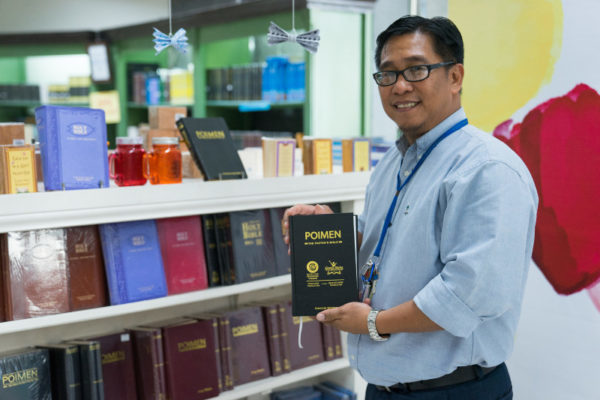Filipino Bible scholar Edgar Ebojo believes that when God’s Word is available in heart languages, it gives people an identity and can inspire transformation.
“If God can speak their language, God can understand them. God can understand their sufferings. . . Passing translations of God’s Word to future generations gives hope.”
In the Philippines, under Spanish rule for 300+ years and American rule for nearly 50, issues of identity are important. Centuries of colonisation have left many Filipinos thinking that anything Western or foreign—goods, resources, systems—is better than its local counterpart. This is one reason for the lack of books and resources that help believers understand how God’s Word applies to their local context and culture.
Ebojo, who received his PhD with support from Langham and today serves as publishing manager for the Philippine Bible Society (PBS) in Manila, is working to change that. He explains that “the Filipino context is also rich in its own expressions and experiences that can help enrich our understanding and appreciation of the Word of God.”
PBS produces translations of the Bible in the languages closest to the hearts of Filipino people. Ebojo says, “We are able to contextualise the Word of God.”
Power of contextualisation
One PBS translation project, launched in 2014, proved to be an incredible source of hope in the aftermath of one of the deadliest disasters that ever hit the Philippines.
Humanitarian groups came to the rescue with relief supplies and medical help to meet physical needs. “But there was something else that the people were looking for,” says Ebojo.
Church leaders knew that the survivors needed spiritual nourishment during those difficult times, and they came to PBS for help. As a response, PBS started translating the Scriptures into the three major dialects spoken in the areas hardest hit by the typhoon.
Ebojo recalls how, during the launch, a mother clung to her new Bible, crying, as she passed it on to a younger member of the community.
Ebojo says the mother became emotional when she realised that God spoke her language – and because God spoke her language, to her it meant that God understood her sufferings, challenges and everything that she was going through.
Also, handing a copy of God’s Word over to a younger person symbolised the passing on of hope to the next generation, says Ebojo. “If this happens in many other communities, perhaps national transformation will come in my lifetime.”
One Bible, different languages
Although the Philippines is a Christian country, Ebojo says 67 percent of the population doesn’t own a Bible. One reason cited was that the Bible was expensive. In response to this need, in 2005, PBS distributed five million copies of the Scriptures to five million poor Filipino families. Ebojo says this project will continue as God provides the resources.
Currently, PBS is working on nine translation projects. One project is called the Filipino Study Bible and will involve the expertise of many Filipino Langham Scholars.
“The aim is to have study notes on particular passages … wherein the notes are contextualised,” shares Ebojo.
Another project is the translation of the children’s Bible into Cebuano, which is a major language in the Visayas region. PBS is also working on translating the New Testament into Tinguian, a language spoken by an ethnic group in northern Philippines.
But one project dearest to Ebojo’s heart is the Poimen Bible. Poimen, Greek for pastor or shepherd, is a fitting name for this Bible, which was born out of a great need to help Filipino pastors, as the majority don’t have formal training on how to study and teach God’s Word.
“These pastors passionately preach the Word of God and lovingly serve their communities,” says Ebojo. “But they don’t have training. . . ”
The Poimen Bible includes articles about the calling of a pastor, legal responsibilities, prayer life, sexual life, and other practical information that can help pastors lead their churches more effectively.
A tool for transformation
As a Langham Scholar, Ebojo reflects on how receiving his PhD with support from Langham has enriched his life and has given him a ministry that can have an enormous impact on a national level. As a Bible translator, Ebojo says he can reach more people. “Once a translation is completed, we can reach communities, we can reach provinces, we can reach regions with the Word of God.”
Langham Partnership is grateful for the faithful and prayerful support of ministry partners like you that make equipping transformational leaders like Edgar Ebojo possible. In Edgar’s own words: “You are making a difference. You are making a big difference in my life, in the life of my family, and the life of my country. The Word of God will transform my country.”
Learn more about how Langham helps raise up biblical leaders like Edgar Ebojo who open God’s Word.
Make a gift that multiplies leaders like Edgar Ebojo around the world.
By Kira Krieger, Langham Partnership US


